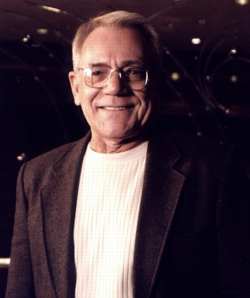My nomination for “news release with the greatest distance between promise offered in the title and reality offered in the body” goes to Unique Invention Helps Cut Work in Half.
Here I was, thinking “wow, I knew some Islander would crack the fusion/fission thing eventually” and what I get, in return, was a cauliflower “banding aid.”
Not to suggest that if I was in the cauliflower business I wouldn’t welcome such a product. But I thought they were talking about my work!
One of my favourite sketches from the old CBC Radio programme The Frantics was called Lateral Thinking Theatre. With that title, if you remember The Frantics, you can probably figure out the rest.
On a trip around Lake Ontario about five years ago with my brother Steve and my mother, we invented a “car game” of the same name. The challenge was for one of us to name a person of some renown, and for the others to concoct a course through their social network that would allow them to have a telephone call taken by this person.
For example, I said “Bill Clinton.” Steve responded by naming his friend Dave, an editor for the CBC Morning News in Halifax, who worked with Henry Champ, Washington Bureau Chief for CBC Newsworld who, in turn, would probably know someone who could get him to Clinton. Not the strongest case, I agree, but you get the idea.
The only problem with this game is that I can never find anyone to play it with. Kind of like charades. I could play charades every night if I could find people to play with.
Lateral thinking has a bad name in my generation. I think this is because late-1960s / early-1970s public and high school teachers suddenly took on lateral thinking as a “teachable concept.” There was many a year during my schooling when you couldn’t go five minutes without hearing or seeing some reference to “developing lateral thinking skills through application of blah blah blah.” There’s nothing like becoming a “teachable concept” to turn something into a pox.
Despite the best efforts of the well-intentioned teaching staffs of recent decades, I wouldn’t rate the lateral thinking abilities of we in western society very high. We’re forever following hierarchies, looking for cause and effect, following predictable neural pathways; it’s rare that we have the courage to think sideways. When we do, it’s amazing what sometimes results.
My own trip around Lake Ontario should not be confused with the Short Film of the Same Name. This 1984 film was directed by Colin Brunton [lateral move: he produced Roadkill, which was directed by the brother of my friend Barbara Jean], filmed by Peter Mettler [lateral move: Jane Siberry’s ex] and stars David McFadden [lateral move: used to be a night proofreader at the Hamilton Spectator; I was a Spec paperboy as a kid] and Al Purdy [lateral move: Al was good friends with my friend Mikey]. Oh, and as far as I know, all of the abovenamed live on or around Lake Ontario. Except me.
This episode [RealAudio] of This American Life is a very interesting discussion of mapping. [from Jon Udell]
Relayed from Ron Boyles, personable owner of Boyles Optical in the PolyClinic in Charlottetown who, in turn, overheard it at The Spa this morning: apparently when the weather is this cold, it really works to kill all the bugs. Silver lining inside a very, very cold cloud.
There were two stories on Compass tonight that should be merged into one.
The first was a story on the opposition to the possibility of the U.S. military renting the former CFB Summerside to use as a training ground.
The second was a story on part-time Islander and business consultant Doug Hall doing pro bono coaching to the folks at Spell Read P.A.T., an Island business.
The approach of the social justice set on the Island to a new and pressing issue appears to be “get Leo Broderick on Compass, quick.” This goes hand in hand with its sister technique “get Leo Broderick a megaphone and get him front of Province House, quick.”
Now I’m the first to commend Leo Broderick for his ceaseless devotion to the causes of social justice (one might say here “God love Leo,” if one were a bona fide Islander). There is not a doubt in mind that he is a brilliant thinker and passionate activist; indeed, coming from solid leftist stock myself, I agree with the fundamentals of much of what he says.
But (Lord!), does he ever need Doug Hall.
The focus of the Doug Hall story (actually a clip from a future Venture story) was on taking SpellRead’s muddled, unfocused, failing marketing system and molding it into something clear, focused and effective. The climax of the episode was a near fit by Hall over the insistence by the SpellRead folks that they not change their name (Spell Read P.A.T.), which, you gotta say, is about the dorkiest, foggiest name going.
Now, I’m pretty certain that bringing the U.S. military to Summerside is a Bad Idea. And I’m fairly certain that a good number of my friends and neighbours would agree with me. But with Leo Broderick as the spokesperson for this notion, what we end up with is a jumbled, unintelligible morase of, well, nothing. It’s a clear case of a good product with bad packaging. And this is where Doug Hall comes in.
I’ve every confidence that if Doug Hall and Leo Broderick were locked in a room for 48 hours, only good things would result.
Can somebody with more influence than I please make this happen?
 I just ordered one of these for my iPod — it’s simply too well designed, and too “exactly what I need” to not purchase.
I just ordered one of these for my iPod — it’s simply too well designed, and too “exactly what I need” to not purchase.
When I bought the iPod, I also purchased an iRock (must everything start with i now?). This unit works well, has a good battery life (though my father had a bum unit that needed to returned because of poor battery life).
It has two big drawbacks.
First, it only broadcasts on one of four frequencies (88.1, 88.3, 88.5, and 88.7 FM), which is a Really Big Problem here on PEI because Radio Canada broadcasts (or leaks heavily) onto all of them. A drive from Summerside to Charlottetown with the iRock tuned to one of those four frequencies will inevitably drop out at some point along Rte. 1 or Rte. 2.
Second, the “on/off” switch is a simply push button, with no lock, and it’s impossible to carry in your pocket (or anywhere else, really) and not mistakenly turn it on (or off).
The iTrip addresses both of these problems: it’s tunable (apparently using the iPod itself somehow) to any FM frequency. And, as it has no batteries (it gets its power from the iPod itself), there’s no on/off switch problem. Indeed it powers off automatically after 30 seconds of silence.
It’s not shipping until the foggy date of “Spring 2003,” so I’m not sure when it will arrive; I’ll report more when I’ve received and tested.
Lots of interesting discussion about drugs, hard and soft, in response to an item I wrote yesterday.
Got me thinking: under the pending new “30 grams isn’t a Big Crime” changes to the laws here in Canada, the challenge, should one wish to have pot, but remain in the “like a parking ticket” crime zone rather than the “go to jail and get a record” crime zone, is to have 30 grams or less in one’s possession at any time.
The problem with this is that it doesn’t fit into the current drug distribution model, which I vaguely understand to be “from the growers in giant truckloads, split into small carloads, split into small lots, out to small dealers, out the consumer.” In other words, just like Wal-Mart.
If Wal-Mart could only hold 30 diapers at a time, their relationship with Procter and Gamble would have to change.
So perhaps Napster-like P2P principles can be applied here.
In other words, rather than One Big Warehouse, you have millions of tiny, sub-30-gram warehouses, and a web-based system for doing sub-30-gram transactions between peers.
This would require changes on the grow-side too, of course, for as long as the giant truckloads still exist, the giant truckload drivers are in jeopardy. Perhaps a “Community Gardens”-type system, where communal sub-30-g plots are grown in a central location, owned individually but with community facilities and expertise?
It seems to me there are some interesting possibilites here.
Disclaimers: 1. I have not actually used pot myself in more than a decade; it started to make my hands go numb for two weeks, which was unpleasant. 2. I don’t actually know anything about how the drug distribution system works, so I may have this all wrong; perhaps others know more and could comment.

Billy Van died on Wednesday.
Although the various obituaries in the media have talked about his work on Sonny and Cher, on Bizarre, and on Hilarious House of Frightenstein, it’s Party Game I’ll remember him for.
Party Game was produced by my hometown television station CHCH-TV in Hamilton, Ontario. The show was hosted by Bill Walker and starred Billy Van as well as Dinah Christie, “Captain” Jack Duffy and various others.
The show was, essentially, “charades on television.” Although it was locally produced and very low budget, I remember it as being, in the fog of my youthful memories, very urbane. I didn’t have Dorothy Parker and the Algonquin, I had Party Game.
Billy — and all of them — were witty and quick. They had fun. It wasn’t Hollywood, but in the 1970s in Ontario, it was pretty good television.
Billy Van will be missed.
Going to school stoned probably means you don’t learn as much as if you weren’t stoned.
But having the cops band together with principals create an organized narc effort is just plain stupid.
First, if you are a narc, you will be ostracized (or at least you should be).
Secondly, if you are narc’d out, the wrath of the school and law the will rain down upon you, but little else about your life will change for the better, and none of the aspects of school that lend themselves to experiencing stoned will change.
School is, on balance, prison like or worse for a good collection of kids. If drugs provide a way out of this, or a way around, I would much rather see a solution based on changing school for the better rather than creating a culture of distrust and suspicion. Which just makes school worse.
Have we learned nothing?
January 9th will forever after be known as “the day that Oliver figured out how to open the door to my office on his own.” Life will never be the same.
 I am
I am